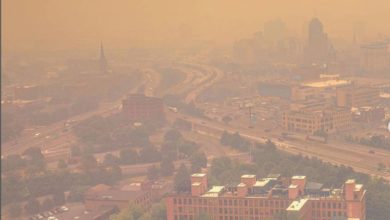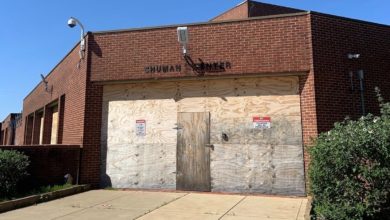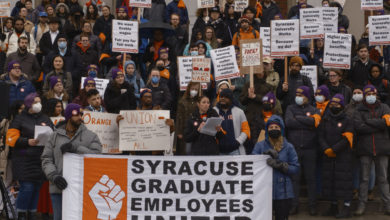On September 8, a People’s History Museum was assembled outside the gates of the Attica Correctional Facility to commemorate the anniversary of the Attica Rebellion. For two hours, visitors from throughout central and western New York toured the exhibit, sharing testimonials to the damaging effects of the extensive U.S. carceral system on prisoners, families, and communities. They rallied together outside the penitentiary gates with chants of “Brick by brick, wall by wall, Attica has got to fall” and “Inside, outside, all on the same side.”
The museum was produced by the Geneva Women’s Assembly. GWA’s Laura Salamendra emphasized why it was important for GWA to organize the event. “We work with a lot of women in our community who feel the effects of mass incarceration. Life is hard enough when you’re poor, with no childcare, no transportation and a pile of legal fees. We need to stop shaming woman for their abusive partners, their addictions and the choices we make for keeping food on the table. Mass incarceration is a community problem that needs a community solution.”
Sponsors and participants included the groups Justice and Unity for the Southern Tier, the New York Poor People’s Campaign, the Committee on U.S. Latin American Relations at Cornell University, and the Geneva branch of the Party for Socialism and Liberation. Bill Martin, the JUST coordinator, said that his group decided to attend the commemoration because “the struggle at Attica and the struggle to close Attica are one. This rally represents what you can see everywhere:” people from all over coming out to put a stop to the aggressive and expanding U.S. prison system.
PSL’s Rob Maclean linked recent problems with police in Geneva to larger issues facing the region. He said, “A Geneva police officer, Jack Montasanto, was recently arrested after choking a woman unconscious inside the police station and on camera, during booking. Despite this brutal assault he was only charged with a class E misdemeanor, this in a city well-known around the region for over-policing, overcharging, and a department that is an important cog in the machinery of mass incarceration, funneling people from our communities, shipping our neighbors out to be warehoused in places like Attica. Most towns in upstate NY are in one way or another economically dependent on a police and prisons system that is out of control.”
The theme of the exhibit was “Every Town is Attica.” Through images, stories, poems, and remembrances, the exhibit depicted the ways that Attica casts its shadow throughout New York, the United States, and the world. “The exhibit is the first phase of a long-term project to collect stories that can educate the public on the history of Attica and its relationship to present day mass incarceration struggles in New York,” explained GWA’s Hannah Dickinson.
Suzanne Flierl Krull from the New York Poor People’s Campaign said that it was important to her to participate in the event because of her own family’s connections to the Attica uprising. Her uncle both prosecuted some of the inmates involved and later recommended that the charges be dropped in the interest of justice. “I have learned much, though, in my study of the Attica uprising and my family’s relationship to it. I have moved away from fear of unknown ‘criminals’ sending death threats to those I love, to fear of a system that perpetuates racism and continues to create environments that ultimately cause riot and bloodshed. We must hear the stories and learn the important lessons of Attica. Then we must demand real, sustainable, and systemic change. I hope this collection of stories will help to do just that.”
Another organizer with the Poor People’s Campaign, Becca Forsythe of Elmira, told about the death of Gary Strobridge, also of Elmira. The events leading to Strobridge’s death are still under investigation. What is clear is that he was having a mental health crisis and that police were called to the scene. “When we send police to a mental health crisis, we criminalize illness and demonize the person suffering,” Forsythe said. “Why weren’t trained professionals on hand who understand mental illness? Fight poverty…not the poor!” Forsythe pointed out that almost a quarter of Chemung County’s 88,681 residents report having more bad mental health days than good one. “There are a lot of reasons for that. Maybe it’s the fact that more than 30% of us have housing insecurity, almost 15% have a disability, a third of us live in a food desert, a quarter of us have experienced food insecurity this year, and almost half of us don’t even have a high school diploma.”
One of the collected pieces was written by Shawn Hudson from the Soundview section of the Bronx: “My hood is one big cell block just like Attica due to heavy police surveillance and presence. Right across the street from my building the Monroe projects are lit up due to the NYPD’s flood lights concentrated on everyone.” “Just like many people failed to see the humanity of those inmates that rebelled in Attica” Hudson continued, “people fail to see the humanity of those that live in my community.”
Another piece, by Melissa Rodney of New York City, noted the connection between mass incarceration and the current escalation of deportations. Immigrants are also prisoners. “Afraid to leave home and not make it back. Imprisoned by an archaic system of rules that determine the dreams of success based on a birth certificate,” she wrote.
Tim Shenk’s contribution talked about a friend locked up in a county correctional facility. His friend was “secretly documenting all of the abuses he could gather from other inmates, which put him in a precarious position.” Shenk said that his friend called him once he was released. After Shenk said, “You’re a free man,” his friend responded “As free as you can be in a racist capitalist society.” Shenk concluded that “Attica, and the whole prison system, lay bare the reality of that racist capitalist system. There is no true freedom for those of us without property, without a total transformation of that system.”
Ithaca students interning at the Committee on U.S. Latin American Relations spoke about the impact of U.S. economic and military expansionism on policing in Latin America. Rebekah Jones observed that U.S. approaches to poverty and crime are now being implemented throughout the region. “We must take responsibility for that.” Daniela Rivero added that this affects “communities in Latin American in the same ways that over policing and unequal resource distribution affects communities in the United States in that they make for conditions under people are incarcerated both in immigration detention centers and in prisons.”
This is the second year that the pop up People’s Museum has appeared at Attica. Concluding the event, Salamendra reminded the assembled that even though every town is Attica, what is most important is that “Attica means fightback.”






